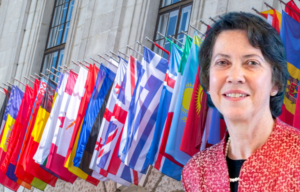Susanne Frueh
Director, Office of Internal Oversight - OSCE Secretariat

In my late 20s I was managing a diverse 60 million dollar environmental non-governmental programme world-wide while at the UN Office for Project Services. I loved the job but didn’t have time to think about whether we were doing the right things and having an impact. So I applied for a job in evaluation which at the time did not require previous evaluation experience but (as today as well) good analytical thinking and research experience. Matching operational know-how with evaluation was an eye opener as my operational background made me also appreciate the real challenges. I love evaluation as you learn so much while you do your evaluations and you have the luxury of diving deep into issues. The same goes for the other two areas of oversight. If done well you can end up being quite influential on the way an organization works and is perceived.
I left the evaluation field in 2007 to work for the newly established Peacebuilding Support Office in charge of supporting the Peacebuilding Commission and managing the peacebuilding fund. The Peacebuilding architecture was the newest reform at the time building on research that a large majority of conflict re-emerged within 15 years of peace agreements. We did not actively focus on the OSCE region at the time in part because of the conflict cycle work being done by the OSCE. It struck me that the OSCE was offering a similar yet different model of peace and security. Naturally we looked at the OSCE for best practices for example in dialogue and community engagement.
I guess my constant quest for learning something new. I had spent the bulk of my UN career in evaluation and then more broadly oversight. I had also moved around a lot, not spending more than 5 years in the same job. After three decades in the UN I wanted to do something else so I started looking for new opportunities outside the UN system and this position came up. What attracted me to the OSCE was its mandate which brings me back to my days with the UN Peacebuilding Support Office where I felt we were making more of a difference to what’s happening on the ground. Admittedly, the region covered by the OSCE is mostly new to me as my prior work took me to Africa, Asia and Latin America. But this was part of the attraction of the job.
The OSCE Office of Internal Oversight aims to help the organization to identify and manage risks, fully work within the common regulatory framework and finally and not least to deliver better results. This requires us to look into both challenges and opportunities and advise management on how to do better. We are successful if our suggestions are taken on board and the organization improves. We therefore also need to be good change management advocates.
I am a strong supporter of gender equality. Gender has been mainstreamed throughout our work – not just with my arrival and I can confirm that we are a good practice example in this regard for other IOs. I am lucky to count on a very committed, professional and forward-looking team.
While I think it has become easier to combine career and family it is essential to stay agile and think ahead. Don’t stay mentally only in your current job and look also to work for different organizations. Developing expertise in one particular area is also good and then map out different paths to help you get where you want to get. Be flexible. Don’t get stuck in the same job or the same location for too long, even if you love it. Take a leap – do not only apply to positions you think you can do. Aim higher. It’s about you and how you are able to engage, take on new challenges and do the best you can.


